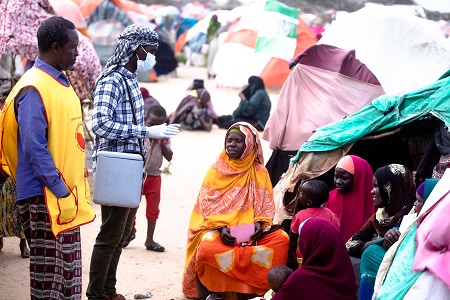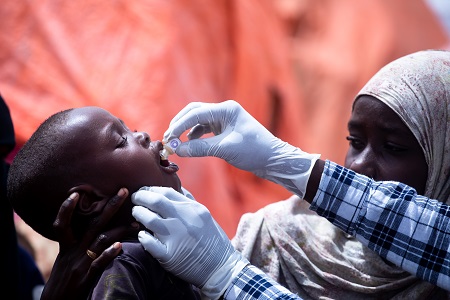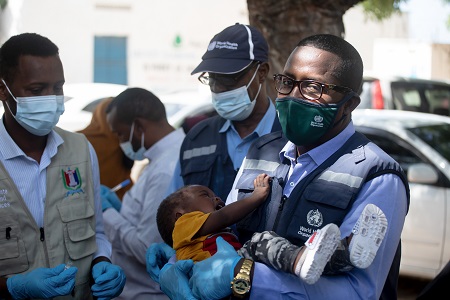 Skilled health care workers explain the benefits of vaccination to communities living in camps for internally displaced persons before offering them life-saving vaccines. Credit: WHO/Ismael Taxta31 July 2022 – As a mother of 3 who is a full-time carer for her young children, when Nesteho falls ill, her household comes to a standstill. Earlier this year, after breakfast one day, the 32-year-old started to suffer from severe bouts of vomiting, with watery diarrhoea. At first, she suspected it may have been bad food, but after getting herself assessed and examined, with the help of a pharmacist she knew, she realized she might have had cholera. Many others in her neighbourhood had been suffering from cholera at the same time.
Skilled health care workers explain the benefits of vaccination to communities living in camps for internally displaced persons before offering them life-saving vaccines. Credit: WHO/Ismael Taxta31 July 2022 – As a mother of 3 who is a full-time carer for her young children, when Nesteho falls ill, her household comes to a standstill. Earlier this year, after breakfast one day, the 32-year-old started to suffer from severe bouts of vomiting, with watery diarrhoea. At first, she suspected it may have been bad food, but after getting herself assessed and examined, with the help of a pharmacist she knew, she realized she might have had cholera. Many others in her neighbourhood had been suffering from cholera at the same time.
Somalia has been experiencing a protracted cholera outbreak, with uninterrupted transmission of the disease since 2017. This has left many Somalis like Nesteho, and their families, suffering from this disease, which is easily preventable.
Limited access to safe water and safe sanitation fuels situation
Cholera outbreaks occur when a large number of people have limited access to safe water and proper sanitation. With only 52% of Somalia’s population having access to improved drinking-water or safely managed drinking-water services, and the current drought making water even more scarce, communities struggle to keep waterborne diseases at bay. The drought has forced close to 1 million people to leave their homes in search of water, food and survival. Nesteho’s is one of these families, that now lives in a camp for internally displaced persons (IDPs) in the October section, in Hodan, Banadir region.
This year, from January to June, Somalia reported 8041 cases of suspected cholera and 37 associated deaths due to cholera. Many of these cases have been laboratory-confirmed. Around 54% of the people infected in 2022 were children under 2 years of age, 49% were female and 28% were reported to be severely dehydrated.
Cholera vaccination campaigns protecting Somalis
 WHO supports the government to conduct vaccination campaigns to reduce the spread of cholera. Credit: WHO/Ismael TaxtaBefore the first round of a cholera vaccination campaign was conducted in Somalia, from 14 to 26 June 2022, with support from the World Health Organization (WHO), the United Nations Children’s Fund (UNICEF), and other partners, Nesteho Muse Mohamed did not realize there was a vaccine for cholera. However, in June, she heard social mobilizers in sound trucks explaining the benefits of cholera vaccines. When she heard a knock at her door during the week of the campaign, Nesteho welcomed the vaccinators and made sure they vaccinated her whole family.
WHO supports the government to conduct vaccination campaigns to reduce the spread of cholera. Credit: WHO/Ismael TaxtaBefore the first round of a cholera vaccination campaign was conducted in Somalia, from 14 to 26 June 2022, with support from the World Health Organization (WHO), the United Nations Children’s Fund (UNICEF), and other partners, Nesteho Muse Mohamed did not realize there was a vaccine for cholera. However, in June, she heard social mobilizers in sound trucks explaining the benefits of cholera vaccines. When she heard a knock at her door during the week of the campaign, Nesteho welcomed the vaccinators and made sure they vaccinated her whole family.
Somalia first began to administer oral cholera vaccines (OCV) in 2017, when the country had 78 865 cases and 1160 deaths reported due to cholera. Since then, the country has conducted a series of cholera vaccination campaigns in addition to other measures.
During the last OCV campaign, conducted from 14 to 26 June 2022, 4984 skilled health workers vaccinated 897 086 (96%) people aged one year and above, against a target of 934 511. They used microplans that serve as maps showing households, and made visits from house to house to vaccinate people over 5 days. They established fixed posts where access to communities was a challenge either due to insecurity or logistical problems. The campaign covered 9 hotspot districts in Banadir region, and the South West and Hirshabelle states.
Over a period of a week, more than 1250 social mobilizers, like the ones Nesteho heard, spread messages about the dates of the campaign and benefits of cholera vaccines. Around 396 supervisors and district-, state-and national-level technical experts supervised teams and monitored activities during the campaign.
Efforts to reduce the disease burden and deaths
 A health worker prepares to vaccinate a child against cholera. Around 900 000 people aged one year and above were vaccinated in the first round of the cholera vaccination campaign. Credit: WHO/Ismael TaxtaAll cholera vaccination campaigns in Somalia are conducted by the Federal and State Ministries of Health and Human Services, in collaboration with experts from the water, sanitation and hygiene (WASH) and health clusters, WHO, UNICEF, and inter-ministerial departments. The use of OCVs are supplementary measures considered by the government and its partners to end cholera and reduce cholera-related deaths in the country, in addition to stepping up other proven public health measures, such as improving access to safe drinking-water and safe sanitation or WASH interventions. Other measures used are risk communication and community engagement, case management, and enhanced disease surveillance, all of which are part of the country’s strategy to end cholera. This national cholera prevention and control strategy was crafted in 2019, with the aim of reducing cholera-related deaths by 90% in 2030.
A health worker prepares to vaccinate a child against cholera. Around 900 000 people aged one year and above were vaccinated in the first round of the cholera vaccination campaign. Credit: WHO/Ismael TaxtaAll cholera vaccination campaigns in Somalia are conducted by the Federal and State Ministries of Health and Human Services, in collaboration with experts from the water, sanitation and hygiene (WASH) and health clusters, WHO, UNICEF, and inter-ministerial departments. The use of OCVs are supplementary measures considered by the government and its partners to end cholera and reduce cholera-related deaths in the country, in addition to stepping up other proven public health measures, such as improving access to safe drinking-water and safe sanitation or WASH interventions. Other measures used are risk communication and community engagement, case management, and enhanced disease surveillance, all of which are part of the country’s strategy to end cholera. This national cholera prevention and control strategy was crafted in 2019, with the aim of reducing cholera-related deaths by 90% in 2030.
Surveillance records show that the number of cholera cases have decreased in Somalia in recent times, partly due to the success of vaccination campaigns.
In August 2022, the Federal Government of Somalia, with support from WHO and other partners, aims to conduct a second round of cholera campaign in the locations covered in the first round in June. This will ensure families like Nesteho’s can keep safe from cholera.




